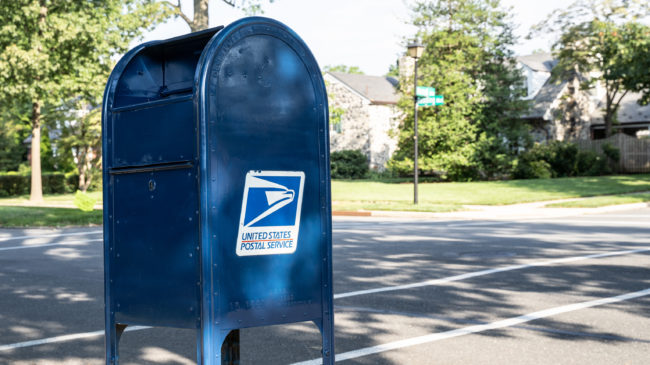As federal lawmakers debate whether to push more taxpayer money into the nearly insolvent United States Postal Service, they should note that technological advances have made the post office’s monopolies increasingly irrelevant and wasteful.
While USPS’ logistical network remains a modern marvel and will play a crucial role in the November election, over the long-term, most of its work could be more efficiently handled by the internet and private competitors without burdening taxpayers with the Postal Service’s financial losses. A Government Accountability Office report earlier this year said USPS “has lost over $78 billion in recent years due to declining mail volumes and rising costs.”
The USPS receives two-thirds of its revenues from so-called “market-dominant” activities, which include first-class letter delivery and “Every Door Direct Mail” (EDDM)–bulk mail delivered to all addresses within a jurisdiction.
Over time, as online services and cell phone messaging have increased, first-class letters’ revenues and volumes have declined sharply, with revenues falling from $35.5 billion in 2000 to $24.4 billion last year. Meanwhile, EDDM volume increased slightly in that time. This means the primary justification for the USPS’ exclusive first-class letter delivery and use of mailboxes (both protected monopolies for the USPS) are becoming less justifiable.
Sure, many people still appreciate the benefits of receiving a love letter, handwritten thank-you notes, and taking part robust intellectual discussion conducted via the mail, but, like the home-delivered glass milk bottles of our distant past, written communication and letter delivery are relics that will increasingly become irrelevant, confined more to museums than mailboxes.
As for what still makes it into Americans’ mailboxes, much of it seems unnecessary. Even in high-tech California, local governments still send notices that could just as easily be emailed or sent by text message. Some firms still send bills, statements, and other documents via mail that all could have been shifted to paperless options long ago. And bulk mail, like political ads and retail coupons, typically get trashed before being viewed, wasting resources from paper to recycling service.
USPS is expected to play a crucial role in the upcoming election, which will rely heavily on mail-in balloting due to the coronavirus pandemic. But in the longer run, it doesn’t make financial sense to view the Postal Service’s primary function as a presidential election year voting service.
Eventually, online voting technology could be a more realistic and better option as local and state governments seek to conduct safe and secure elections. For a long time now, shareholders in companies have been submitting their proxy ballots online. And while the desire to hack them exists, we also rarely hear of any voter fraud in company elections.
We have also seen initial forays of online voting into state and local elections. Tusk Philanthropies has funded mobile voting initiatives in several states utilizing technology platforms built by groups like Democracy Live and Voatz. Pilot programs were initially focused on providing services to overseas voters and those with disabilities, but in a recent King County, Washington, special election mobile voting was available to the entire electorate. GeekWire reported:
The pilot was a collaboration between the King Conservation District — a resource-management organization operating under Washington state authority — and King County Elections, Tusk Philanthropies, Democracy Live, and the National Cybersecurity Center. Democracy Live is a Seattle-based company that makes mobile ballots and other election tools.
The National Cybersecurity Center is a Colorado-based think tank that launched in 2018. The organization conducted the audit of the King Conservation District election and discovered 93.77 percent of voters opted to cast their ballots online.
The electronic signatures required to submit online ballots had an approval rate of 99.63 percent, according to the audit. With 6,280 ballots submitted, voter turnout doubled compared to last year’s King Conservation District Board of Supervisors election, Tusk Philanthropies said. That turnout rate could be driven, in part, by the increased publicity the election received due to the mobile voting pilot.
Online voting certainly has risks, but many of them can be mitigated through effective management and security procedures. And an important advantage of online voting is that vote counting is immediate so there would not be weeks of long waiting for ballots to trickle in and votes to be recorded.
The other primary focus of the USPS’ operations—parcel delivery—remains competitive with private companies. But as letters decline and parcel delivery remains stable or grows with shifts to online shopping, we should start to question why mailboxes can’t be used for parcel delivery by non-USPS entities, including FedEx, UPS and DHL. These companies would gladly welcome the opportunity to use mailboxes to serve their customers more completely and efficiently.
America has a wonderful legacy of letter carriers delivering our mail —“neither snow nor rain nor heat nor gloom of night” can prevent its delivery is the slogan many of us heard. We should be grateful for their efforts through the decades, but time marches on and we should recognize innovations have eliminated the need to send most documents by mail. The technological marvels of recent decades give us the ability to communicate faster, better and cheaper. For items that still must be shipped, private competitors stand ready to do the job without the high costs to federal taxpayers.


